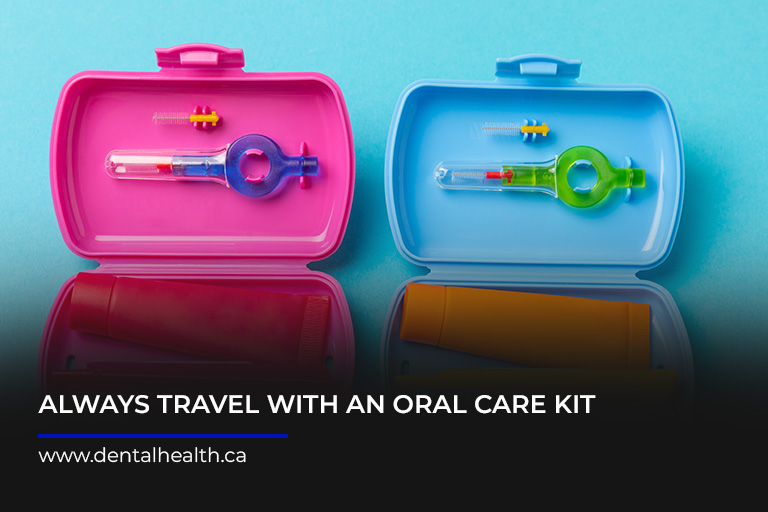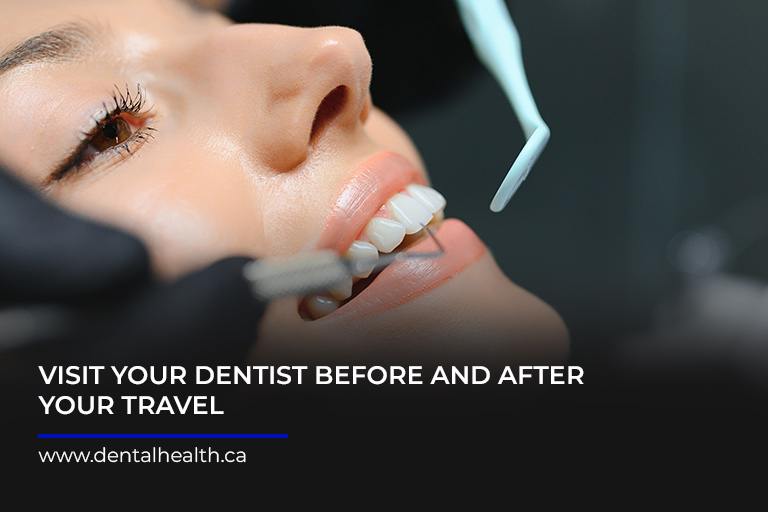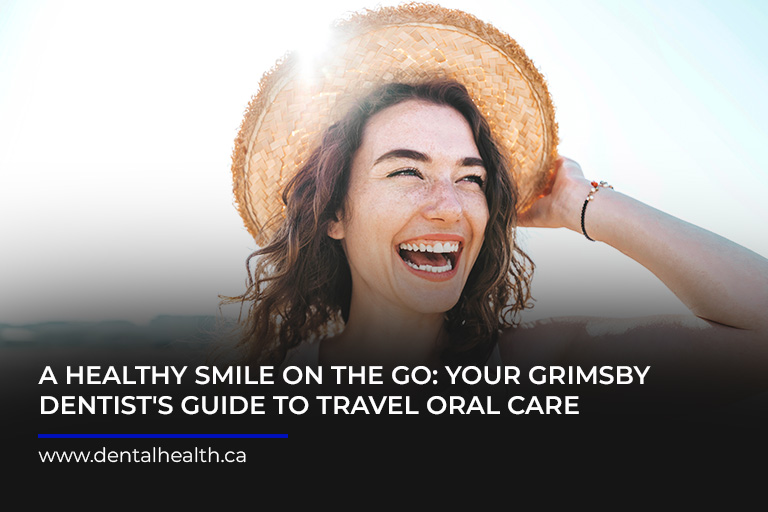Maintaining oral health is a crucial part of overall well-being, even when you’re exploring new destinations. However, travel can disrupt routines, making it easy to neglect oral hygiene. From changes in diet to limited access to dental care, various factors can affect your dental health while on vacation. By following some simple guidelines and packing a few essentials, you can ensure your smile stays bright and healthy throughout your travels.
The Essential Travel Oral Care Kit
A well-prepared travel oral care kit is your first line of defense against dental issues while travelling. Ensure you have the following items packed and ready to go:
- Travel-sized toothbrush and toothpaste: Choose a soft-bristled brush and fluoride toothpaste for optimal cleaning and protection.
- Dental floss or interdental brushes: These tools are essential for removing food particles and plaque from between teeth, where toothbrushes cannot reach.
- Mouthwash: A travel-sized bottle of mouthwash can help freshen breath and kill bacteria, especially when brushing is not immediately possible.
- Fluoride rinse: Fluoride rinses provide additional protection against tooth decay, particularly in areas with fluoridated water.
- Dental mirror: This tool can help you identify any potential issues early on, such as food stuck between teeth or developing cavities.
- Lip balm with SPF: Protect your lips from sun damage, which can lead to dryness and cracking.
- Sugar-free gum: Chewing sugar-free gum after meals can help stimulate saliva production, which helps neutralize acids and wash away food particles.
- Over-the-counter pain reliever: Pack a small supply of pain relievers in case of toothaches or other dental discomfort. Remember, these pain relievers should only be used temporarily and do not replace professional dental care.
Oral Hygiene Routine on the Road

Maintaining your regular oral hygiene routine while travelling is crucial for preventing dental problems. Follow these simple steps to keep your smile healthy:
- Brush twice a day: Brush your teeth thoroughly for at least two minutes, twice a day, ideally after breakfast and before bed, using a timer to ensure you’re brushing for the full two minutes. This practice removes plaque, prevents tooth decay, and promotes fresh breath.
- Floss daily: Floss or use interdental brushes at least once a day to remove plaque and food debris from between teeth and below the gumline. If you’re new to flossing, consult your dentist or hygienist for proper technique.
- Use mouthwash: After brushing and flossing, rinse with an alcohol-free mouthwash for 30 seconds to provide additional protection against bacteria, reduce plaque, and freshen your breath.
- Avoid smoking and excessive alcohol: Avoid smoking and limit alcohol consumption, as both can negatively impact your oral health, increasing the risk of gum disease, tooth loss, and oral cancer.
- If you wear dentures or retainers, clean them regularly: Maintain the cleanliness of your dentures or retainers by following your dentist’s instructions for cleaning and storing them. Remove them at night and soak them in a denture-cleaning solution.
- Limit sugary and acidic foods: Sugary and acidic foods can erode tooth enamel and increase the risk of cavities. Enjoy them in moderation and rinse your mouth with water afterwards. Be mindful of hidden sugars in sauces, dressings, and processed foods.
- Choose healthy snacks: Prioritize healthy snack options such as fruits, vegetables, cheese, or nuts over sugary or processed foods. These choices offer essential nutrients for oral health and contribute to overall well-being.
- Drink plenty of water: Water helps wash away food particles and neutralizes acids, protecting your teeth from decay. Carry a reusable water bottle and refill it throughout the day, especially in hot climates.
- Limit caffeinated and alcoholic beverages: These drinks can dehydrate your mouth and contribute to dry mouth, which increases the risk of cavities and bad breath. Choose water or herbal teas as healthier alternatives.
- Chew sugar-free gum after meals: Chewing sugar-free gum for 20 minutes after meals can help stimulate saliva production, which neutralizes acids and washes away food particles. Look for gum with the Canadian Dental Association (CDA) Seal of Acceptance.
Travel Oral Health Emergencies: What to Do
Even with the best precautions, dental emergencies can still occur while travelling. Here’s what to do if you experience any dental problems:
- Toothache: Rinse your mouth with warm water and floss to remove any food particles that may be causing the pain. If the pain persists, consult a local dentist or pharmacist for recommendations. Avoid placing aspirin directly on the tooth or gums, as this can cause burns.
- Chipped or broken tooth: Rinse your mouth with warm water and apply a cold compress to the outside of your cheek to reduce swelling. Contact a dentist as soon as possible. Save any broken pieces of the tooth if possible.
- Lost filling or crown: If you can find the filling or crown, keep it safe and bring it with you to the dentist. If not, try covering the exposed tooth with sugar-free gum or dental wax until you can see a dentist. Avoid chewing on the affected side of your mouth.
- Abscess or infection: Rinse your mouth with warm saltwater and see a dentist immediately. In the meantime, avoid hot or cold foods and drinks. Over-the-counter pain relievers may help manage discomfort.
- Bleeding gums: Rinse your mouth with warm saltwater and apply gentle pressure with a clean gauze pad. If bleeding persists, seek dental care. This could be a sign of gum disease or other underlying oral health issues.
Post-Travel Dental Checkup

After returning from your travels, it’s a good idea to schedule a dental checkup. Your dentist can assess your oral health, identify any potential issues, and recommend any necessary treatment. This is especially important if you experienced any dental problems while travelling or noticed any changes in your oral health.
Maintaining good oral health while travelling is achievable with a little planning and effort. By following these tips and packing the essential oral care kit, you can enjoy your vacation without worrying about dental problems. If you have any questions or concerns about oral care, don’t hesitate to contact Kingsway Family Dentistry at (905) 563-4001. Remember, a healthy smile is a beautiful souvenir from any trip!

